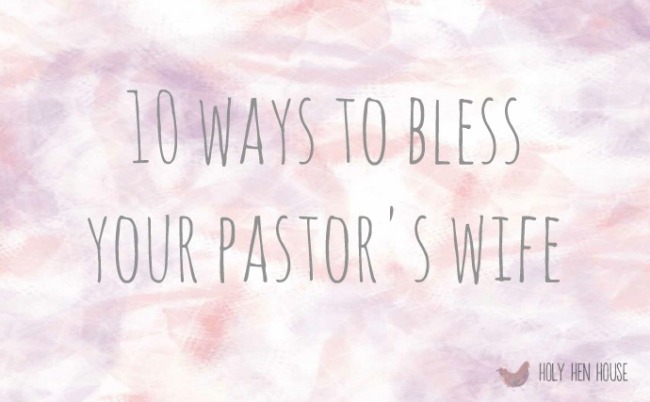In honor of Pastor Appreciation Month, we want to spread the love to our pastors’ wives as well. This post was written by Rachel over at www.holyhenhouse.com. Drop by a see what other wonderful things she has to say.
It’s been three years since my husband began his full time ministry.
From the moment Josh stood in the pulpit on that first hot July Sunday, I’ve been know as “the pastor’s wife” in our little town. In these three short years, I have been learning and growing so much as I serve alongside and support my husband! There have been struggles and hurdles, of course, but joy and blessings overflow.
Our wonderful church family has made my role an easy one by caring for, respecting, and loving me (and my family) so well. I am so thankful for that! I am truly in awe of their kindness and generosity. The heart of Jesus shines so brightly through them. After being inspired by that love, I created a list of ways I have been blessed and encouraged by the people of our church and I wanted to share it with you. Please know that these suggestions are not meant to be self serving. Perhaps they will help you to understand your own pastor’s wife a bit better? And maybe even give you ideas for ways to bless her!
1. Give her grace. Here’s a little secret – she’s not perfect! : ) She is no different than you or anyone else sitting in the pew. She can’t do it all, serve in every way, be at everything, and remember every single thing. She has struggles and hurts and insecurities. And if she’s anything like me, she messes up sometimes and needs forgiveness.
2. Respect their family time. With meetings, visits, teaching, studying and sermon writing, Josh is pulled in many directions and can be working anytime from the hours of 6am to 11pm, seven days a week. His days and evenings are very full so when he is home, he is home. Our family time is a priority to him and he is intentional about scheduling in that time together. There are occasional calls that come in during dinner or in the late evening, but for the most part that time is spent without interruption.
3. Accept and celebrate her for who she is. She doesn’t play the organ or piano? No biggie! She doesn’t lead a ladies Bible class the same way as the previous pastor’s wife? Not a problem! She runs into church at the bells with wet hair and a toddler on her hip who’s cramming crackers in his mouth? Hey, she made it!! That last one certainly never happens me me. ; )
4. Spoil her a bit. It certainly doesn’t have to be often and it doesn’t have to be much – a sweet card in her mailbox, little present, tickets to a local event, gift card for a restaurant or grocery store, or bouquet of flowers are all things that let your pastor’s wife know I’m thinking of you and appreciate you. I guarantee she will be oh so thankful and that you will make.her.day.
5. Don’t involve her in church gossip. Not only is it wrong and yucky to spread rumors and such, it’s also extremely uncomfortable and discouraging for the pastor’s wife to be put in a situation when one member is talking badly about another member. I’ve only experienced this a tiny handful of times and I pray I’ve handled it in a God-pleasing way.
6. Invite her along. Whether it’s meeting for a quick coffee, lunch with a group of gals, or a fun day at the lake, don’t be afraid to extend an invitation! Pastor’s wives are in need of and crave fun, friendship, and fellowship, too. Inviting her along opens up a door to get to know her on a deeper level. That being said, if she declines an invitation, don’t get frustrated or take it personally that she has to pass this time!
7. Offer to do something/provide something. Baby-sitting for the evening. Veggies from your garden. Hand-me-down kids clothes. Dry cleaning the pastor’s white church robe. Picking up a kiddo from soccer practice. Chocolate chip cookies. The list could go on and on! It’s likely that your pastor’s family doesn’t live near relatives, so having people offer these simple, but wonderful things can definitely make them feel more at home.
8. Keep it positive. Please don’t speak negatively about the pastor to her or complain about a church issue that is out of her control. Those are things you need to take directly to the pastor himself. I have not had to deal with this myself, but I can see how this would be extremely stressful, discouraging, and disappointing for a pastor’s wife.
9. Praise her husband in front of her. What wife doesn’t want to hear nice things about her wonderful hubby?! Hearing positive feedback about an event my husband planned, a sermon he gave, or an impact he made makes me smile. I am so proud of Josh and it’s a terrific feeling when others acknowledge his hard work and dedication as well.
10. Pray for her. This is the most important thing! Feel free let her know that you are doing so. She loves you dearly and having you pray would mean the world to her!
Is there anything you would add to this list? Or if you are a pastor’s wife, what is a way you have been encouraged and blessed?







